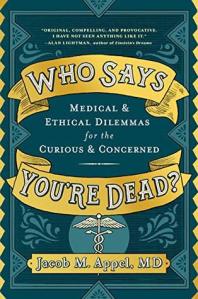 Drawing upon the author’s two decades teaching medical ethics, as well as his work as a practicing psychiatrist, this profound and addictive little book offers up challenging ethical dilemmas and asks readers, What would you do?
Drawing upon the author’s two decades teaching medical ethics, as well as his work as a practicing psychiatrist, this profound and addictive little book offers up challenging ethical dilemmas and asks readers, What would you do?
In short, engaging scenarios, Dr. Appel takes on hot-button issues that many of us will confront: genetic screening, sexuality, privacy, doctor-patient confidentiality. He unpacks each hypothetical with a brief reflection drawing from science, philosophy, and history, explaining how others have approached these controversies in real-world cases. Who Says You’re Dead? is designed to defy easy answers and to stimulate thought and even debate among professionals and armchair ethicists alike.
Review:
3.5 stars
I wasn’t sure if I should pick up this book, but when I saw that the author is not only a practicing psychiatrist but also a bioethicist and attorney, I couldn’t resist.
Appel looks at 79 dilemmas, some rare (can a millionaire advertise for a new liver?) to situations many of us will face (decisions regarding end of life care). Each case is introduced in a succinct vignette and followed up with a reflection covering legal, ethical, and personal issues that may affect the decision made. It truly is a reflection – Appel doesn’t rule for one side or the other, and he’s sure to mention factors that could make a seemingly off-putting choice rational. The setup gives you a moment to sit and reflect on what you would do in that situation. If a patient revealed that he’s gotten away with murder, would you report it to the police? Would you give someone on death row a liver transplant? What do you do when the sisters of a dying patient disagree about treatment?
The situations themselves are crafted with care. Some are edge cases pushing beyond settled law, some straddle an ethical line, and others show the most sympathetic patient for a particular treatment or intervention. While the vignettes are fictional (doctors Scarpetta, Hawkeye, and Jekyll make appearances) they’re based on actual people and cases, mostly in the US and UK. If you’d like more info there’s a robust appendix pointing to related papers, articles, and books for each dilemma.
With the heavy and at times disturbing medical content it’s not a book I can recommend to everyone, but I found it fascinating. It helped clarify (or occasionally muddy) my thinking about these ethical issues, and pointed me towards some that I didn’t even know existed. Did you know that with gene editing technology it may be possible to use ancient DNA to bring a Neanderthal to term in a human woman? It’s creepy and seems like an absolute no-go, and while Appel leans heavily in that direction he does imagine a semi-apocalyptic scenario where it might make sense.
I had small quibbles with two scenarios. One struck me as slightly ableist and used small d deaf to refer to capital D Deaf culture and people. The other talked about wrongful birth, where a doctor is negligent tying tubes and the woman becomes pregnant and ends up giving birth to a child, her fifth. Juries find it difficult to award damages for having a healthy baby, wanted or not, but the discussion didn’t touch on ways that settlement money could help the family meet the unexpected expenses of raising another child, not to mention psychological impacts. The other scenarios offer nuanced thoughts so this one felt out of place.
Those are only two small concerns, though – overall I found Who Says You’re Dead? fascinating and engrossing. I put it down now and then to take a breath – who wouldn’t after delving into the ethics of full-body transplants? – but it’s a compulsive read for medical nonfiction fans and armchair ethicists.
Thanks to Algonquin Books and Edelweiss for providing a review copy.
Is Sophie Fevvers, toast of Europe’s capitals, part swan…or all fake?

 The ancient city of Troy has withstood a decade under siege of the powerful Greek army, which continues to wage bloody war over a stolen woman—Helen. Briseis was queen of one of Troy’s neighboring kingdoms, until Achilles sacked her city and murdered her husband and brothers. Briseis becomes Achilles’s concubine, a prize of battle, and must adjust quickly in order to survive a radically different life, as one of the many conquered women who serve the Greek army.
The ancient city of Troy has withstood a decade under siege of the powerful Greek army, which continues to wage bloody war over a stolen woman—Helen. Briseis was queen of one of Troy’s neighboring kingdoms, until Achilles sacked her city and murdered her husband and brothers. Briseis becomes Achilles’s concubine, a prize of battle, and must adjust quickly in order to survive a radically different life, as one of the many conquered women who serve the Greek army. Drawing upon the author’s two decades teaching medical ethics, as well as his work as a practicing psychiatrist, this profound and addictive little book offers up challenging ethical dilemmas and asks readers, What would you do?
Drawing upon the author’s two decades teaching medical ethics, as well as his work as a practicing psychiatrist, this profound and addictive little book offers up challenging ethical dilemmas and asks readers, What would you do? Stop me. Please.
Stop me. Please.